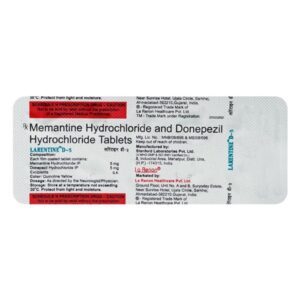DONEPEZIL + MEMANTINE
Donepezil: Donepezil is a medication used to treat symptoms of dementia, including Alzheimer’s disease. It belongs to a class of drugs called cholinesterase inhibitors.
The main goal of donepezil is to improve memory, cognition, and daily functioning in individuals with dementia. By inhibiting acetylcholinesterase, an enzyme that breaks down acetylcholine in the brain, donepezil increases the levels of this neurotransmitter. Acetylcholine is important for memory and learning processes, and its deficiency is thought to contribute to the cognitive decline seen in Alzheimer’s disease.
The recommended starting dose of donepezil is usually 5 mg taken orally once per day, usually at bedtime. After at least 4-6 weeks of treatment, the dose may be increased to 10 mg once a day, depending on the patient’s tolerance and response to the medication.
Like any medication, donepezil has potential side effects. The most common side effects include nausea, diarrhea, insomnia, muscle cramps, fatigue, and loss of appetite. These effects are typically mild and may improve over time. Rarely, more severe side effects such as fainting, chest pain, severe stomach pain, and difficulty urinating may occur. It is important to notify a healthcare professional if any of these side effects are experienced.
It is worth mentioning that donepezil may interact with other medications, so it is important to disclose all current medications to a healthcare professional before starting treatment. Additionally, the effects of donepezil may be enhanced by drugs that increase the levels of acetylcholine, while drugs that block acetylcholine receptors may decrease its effectiveness.
In conclusion, donepezil is a medication used to treat symptoms of dementia, specifically Alzheimer’s disease. It works by increasing the levels of acetylcholine in the brain and improving memory and cognition. The starting dose is typically 5 mg, which may be increased to 10 mg after several weeks. Side effects are generally mild and include nausea, diarrhea, and insomnia. However, more serious side effects are possible, and it is important to discuss any concerns or adverse reactions with a healthcare professional.
Memantine: Memantine is a medication that is primarily used for the treatment of Alzheimer’s disease. It belongs to a class of drugs called NMDA receptor antagonists.
In Alzheimer’s disease, there is an excessive activation of the N-methyl-D-aspartate (NMDA) receptors, which leads to an overstimulation of the glutamate neurotransmitter system. Memantine works by blocking the NMDA receptors and reducing the abnormal glutamate activity. This helps to restore the balance of neurotransmitters in the brain, improving cognitive function and memory.
The usual starting dose of memantine is 5 mg once daily, which is gradually increased over a period of weeks to a maintenance dose of 10 mg twice daily. However, the dosage can vary depending on individual patient factors and should be determined by a healthcare professional.
Common side effects of memantine include dizziness, headache, confusion, and constipation. Some patients may also experience fatigue, agitation, hallucinations, and an increased risk of falls. It is important to note that these side effects are not experienced by everyone and may vary in severity from person to person.
Before starting memantine, it is important to inform your healthcare provider about any pre-existing medical conditions or medications you are taking to ensure the safe and effective use of the drug. They can provide personalized information and advice based on your specific situation.



